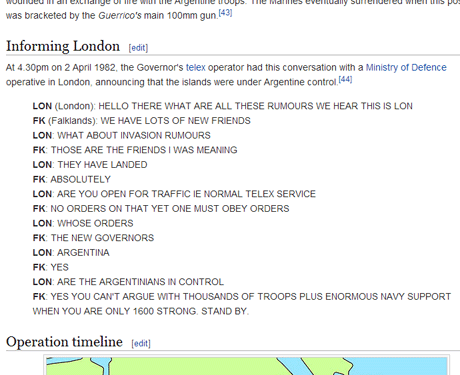Argentina is, once again, suffering the consequences of populist-but-incompetent governance, and the state of the armed forces clearly reflect the economic woes of the country. Last year, Rowan Allport contrasted the Argentinian military in the late 1970s leading up to the Falkland War with the hollow shell of today:
It is difficult to believe from the vantage point of 2014, but in 1978, Argentina came within hours of invading Chile. The scheme arose as a result of a conflict between the two countries regarding the ownership of the Picton, Nueva and Lennox islands, which are situated at the western entrance to the Beagle Channel – a waterway running between the Pacific and Atlantic Oceans. The plan envisaged the seizure by the Argentine military of these and a number of other islands, to be followed shortly after by an invasion of mainland Chile, with the intent of capturing the capital Santiago and other key population centres. From this position, the Argentine leadership believed that it would be in an unassailable position to force Chile into a beggar’s peace regarding its territorial demands. Whilst the operation was ultimately aborted at the last minute, it was the then government’s belief that Buenos Ares had the ability to exercise hard power on a substantial scale – together the domestic economic crisis it was experiencing – that ultimately led it to once again travel down the path of aggression with the invasion of the British-governed Falkland Islands in 1982. Although Argentina did not expect the British to attempt to retake the territory and ultimately lost the conflict, its armed forces were – in addition to performing the initial amphibious assault which captured the islands – able to deploy a carrier group, surface action groups and submarines into the South Atlantic, and managed to inflict significant losses on the British using modern anti-ship weapons and a substantial fleet of jet aircraft.
Flashing forward over three decades, the Argentine Armed Forces find themselves in a calamitous state. The depleted Argentine Navy rarely puts to sea, is desperately short of spare parts, and much of the ordinance carried by its ships is past its expiration date. 2012 saw the training ship ARA Libertad seized in Ghana on the orders of a hedge fund seeking reparations from the Argentinian government [blogged here]. Shortly afterward, the corvette ARA Espora was stranded in South Africa for seventy-three days after the German company hired to repair a mechanical fault refused to carry out the work as a result of the Argentine government’s unpaid bills. Then, in a final indignity, 2013 saw the sinking of the decommissioned destroyer ARA Santísima Trinidad in port as a consequence of poor maintenance [blogged here]. The Argentine Air Force largely consists of a collection of obsolete aircraft mostly dating back to the 1970s, which are frequently grounded due to poor serviceability. The Argentine Army has deployed on operations without some of even the most basic equipment and rarely has the resources for training.
So how did this situation arise? As with most such calamities, the root causes are both financial and political. The story of Argentina’s economic fall from grace – both historical and contemporary – is well known. In 1914, Argentina was the tenth wealthiest country in the world, but a century later it has fallen to fifty-fourth place. The last three decades has seen the country careen from crisis to crisis. During the 1980s, Argentina was crippled by inflation and external debt. The free market reforms begun under President Carlos Menem allowed a short reprieve, but a succession of financial crises in Mexico, Brazil, Russia and South East Asia during the 1990s – combined with a failure to tackle numerous underlying domestic economic issues and corruption – sowed the seeds of further catastrophe. In 1998, Argentina’s economy fell into a depression, climaxing with the largest debt default in human history. Though a commodities boom and a currency devaluation allowed room for a brief recovery, the increasing use of interventionist economic policies by the government, along with the 2008 global financial crash and attempts by so-called ‘vulture funds’ to obtain payment for debts on which Argentina had previously defaulted led the country back into crisis, forcing another default in 2014.
So how bad is it now? Argentina is being forced to retire the last of their supersonic jet fighters because they can neither maintain nor replace them:
According to IHS Janes
“The Argentine Air Force is drastically cutting staff working hours and decommissioning its last fighter aircraft amid continuing budget issues.
A recently published daily agenda indicates that the service’s working hours have been significantly reduced, from 0800 to 1300; rationing of food, energy consumption, and office supplies has been directed headquarters staff and property residents; and only the minimum personnel required to staff headquarters, directorates, and commands are working.
These orders, issued on 11 August, take effect 18 August. A next step will cut Monday and Tuesday as working days. Moreover, air force officials said any aircraft taken out of service will not undergo maintenance for now.”
This leaves the Argentine military with just two types of jet aircraft A-4’s and IA-63’s and both are subsonic, decades old and barely serviceable. Argentina had looked into buying new Gripen’s from Sweden via Brazil but this was vetoed by the United Kingdom which makes a large number of internal components for the aircraft. They had also looked at JF-17’s from China, but the JF-17s proved too expensive to modify.




